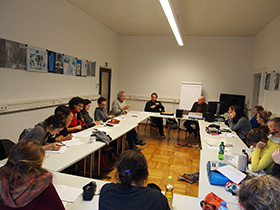teaching creative writing in europe eu project 2014
classes and lectures
paris (fra) and jyväskylä/orivesi (fin)
project funded by the eu's erasmus+ programme

TEACHING CREATIVE WRITING
from its start in 1992, vienna poetry school (sfd) has put a focus on internationality.
in 2014, sfd took part in the following international conferences with holding lectures and a class, and with the participation in panel discussions and workshops/classes.
eacwp-symposium
june 12-14, 2014, paris
the vienna poetry school participated in the symposium of the eacwp (european association of creative writing programmes/president: javier sagarna, escuela de escritores/ede, madrid) – of which the sfd is a founding member – in paris (organized by aleph écriture and les ateliers d’écriture élisabeth bing).
orhan kipcak and harriet nachtmann presented the results of a collaborative project in visual poetry between schule fuer dichtung/vienna poetry school and fh joanneum/university graz.
“poetry in motion”
poems of the sfd-project “inconceivable number poetry” visualized by the media design class at fh joanneum
“vulgar volumes” of neo-liberal financial management were the starting point of vienna poetry school’s web-project “inconceivable number poetry” (http://sfd.at/zahlenpoesie, in german). a selection of the poems that were created has been visualized by students of fh joanneum: 14 video clips – abstract, figurative, funny, wicked, as this disgusting subject deserves.
international conference on pedagogy of writing
october 21-25, 2014, jyväskylä and orivesi, finland.
organized by EACWP (european association of creative writing programmes), university of jyväskylä, orivesi college of arts and the writers union of central finland.
from the call for papers:
this eacwp second european conference about creative writing pedagogy is devoted to the sharing of teaching practices, approaches and points of view about our various ways to teach writing.
the aims of the conference are:
- to join european universities, schools, teachers and institutions that work in teaching creative writing and discuss about it from a pedagogical point of view
- to deepen and refine the map of our different ways of teaching writing
- to share methodologies and pedagogical approaches
- the individual and social impacts of teaching creative writing
- the multilingual and intercultural aspects in pedagogy of creative writing
the conference is intended for teachers, experts, researchers, and students in the fields of writing and pedagogy. the interdisciplinary approaches are especially welcome. the hosts welcome both scientific and popular papers. the presence of professionals from outside of europe will be welcome, too.
https://www.jyu.fi/en/congress/writing
lectures
held by juergen berlakovich, fritz ostermayer and orhan kipcak at the university of jyväskylä:
abstracts:
juergen berlakovich
acoustic poetics
the music of language
for years i have been developing an independent concept of acoustic poetics, both theoretically as well as in my artistic practice. where does language become sound? is there a semantics of sound? how does the acoustic world around us finds its way into literary narratives?
at the sfd – schule für dichtung / vienna poetry school – i give classes, lectures and workshops that deal with the above questions. the overriding subject of these classes and workshops is the influence of the huge variety of historical forms of acoustic poetry on contemporary, interdisciplinary art forms in the field of literature and sound.
in my lecture in jyväskylä i want to talk about the music of language. what are the impacts of sound, rhythm, harmony and melody on writing and composing a text of prose? what practical enrichment can the knowledge of acoustic poetry, and certain basic techniques of how to work with language as a sound source and compositional material bring to the process of writing? acoustic poetry can give us important technical and artisanal impulses on writing texts of prose as well as helping us to develop new narrative forms that oscillate between literature, sound and music.
in this sense, a closer insight into acoustic poetics can be equally interesting for authors, students and teachers who genuinely don’t deal with these topics in their artistic and pedagogical practice as well as for those who are interested in teaching and developing new forms of literature.
fritz ostermayer
creativity is overrated! is creativity overrated?
new strategies for the good old "ouvroir de littérature potentielle"
art-isms as ideologies of exclusion and discrimination belong to the 20th century with which they have also disappeared. likewise, after the termination of all literary avant-gardes, poetry now seems to be caught in an eternal postmodernism: on the one hand, without a conceptual regime, narration can be again quite conventional, on the other hand a new literary conceptualism adapts tried and tested avant-garde techniques from the visual arts and “experimental” music. not even the by now also discredited “originality” has to be called upon in order to state: really impressive results neither come from the conservative neo-narrative front nor from this second-hand avant-garde who believes that new poetic territory can be conquered by borrowed strategies such as sampling, remix, mashup or appropriation.
“writing is 50 years behind painting”, claimed brion gysin in 1959, co-inventor of the literary cut-up-technique. “brion gysin might still be right”, fears kenneth goldsmith in 2011, tireless propagandist of “uncreative writing”. one would almost like to agree with goldsmith, were it not for numerous artists who actually step on “post conceptual” virgin soil. these artists are relatively unknown in literature circles, as a result of many of those authors locating themselves in the context of performance, transmedia and net-activism, because those fields better provide for a process-oriented, combinatorial and boundary-expanding writing than the space between two book covers.
my lecture will highlight some positions of this new literary concept art with regards to the “unauthorised”, because only the “self-authorising” of these artists to become scientists and engineers – so to say their arrogance to poach in other people’s territory – gives their poetry truly a new sparkle.
a few names? for example, christian bök, sandra huber, vanessa place, traumawien, anonymouth – all of them brilliant creators in the brilliant tradition of oulipo.
orhan kipcak
phont, media gravity, didactics
in january of this year the vienna poetry school has finished another internet project providing interactive, experimental design options for writers. first evaluations of this project with the name phont were introduced last year, its results will be presented briefly this year and should initiate further reflections on the influence of interactive multimedia and online communication on the role and the significance of writers and their education.
on phont: the application integrates characters of the international phonetic alphabet into a virtual keyboard. the programe builds language-constructions with the sounds matching these characters. the phonetic alphabet divides the human speech into its most basic units, which are then reassembled by phont. this process creates blurs and ruptures, which illustrate how fragile and multi-layered the dissected meanings of speech really are.
besides the importance of their aesthetic gravity for the design of media, netprojects such as phont also address the question of influence on the established cultural, political and media-economic settings of distribution and further processing of literature. these elements, for a good part, make up the foundation on which the meaning and authority of the writing community is built.
the mainstream concept of autonomous and self-determining authorship is questioned by the interactive, algorithmic or generative production method of such projects. for this reason and due to their fundamentalistic interpretation of language and text production, these machines are excellent didactic appliances.
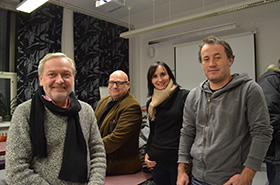 (by ede)
(by ede)
fritz ostermayer, orhan kipcak, harriet nachtmann, jürgen berlakovich
workshop
class held by juergen berlakovich at orivesi college of arts
acoustic poetics
history - theory - practice
soundwise and musical aspects of language in literature
1. sound and rhythm of language in texts of prose.
2. basic procedures on how to capture, synthezise and compose the spoken word in order to use it in literary live-performances.
builders of poetry worlds
screening of the film
"builders of poetry worlds.
vienna poetry school. video conversations with christian ide hintze"
(dvd, a film by tina bara, sfd 2013 >> info) at the orivesi college of arts.
ide hintze on the history of the vienna poetry school, about eros, the street, sappho, embers, the coffee house, writing in the water, etc. anecdotes, amongst others, on allen ginsberg, christian loidl, henri chopin, h. c. artmann, blixa bargeld, falco, friederike mayröcker.
--
guest lectures in vienna/institute for creative writing
on 31 oct. 2014, the lectures given at the creative writing conference in finland were subsequently also presented as part of the lecture-series "media, experimental and interdisciplinary forms of creative writing", univ.lect. orhan kipcak, at the institute of language arts at the university for applied arts in vienna.
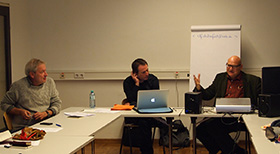 (by sfd)
(by sfd)
fritz ostermayer, juergen berlakovich, orhan kipcak
project funded by:
project nominated for the erasmus+ award 2015 http://www.bildung.erasmusplus.at/award2015
this project has been funded with support from the european commission.
this publication reflects the views only of the author, and the commission cannot be held responsible for any use which may be made of the information contained therein.
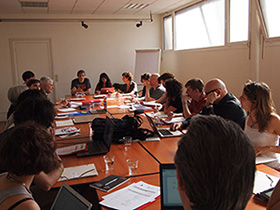
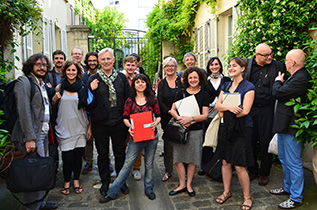 (by sfd & ede)
(by sfd & ede)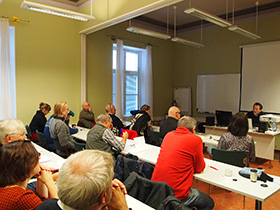 (by sfd)
(by sfd)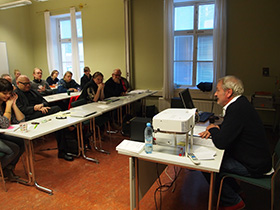 (by sfd)
(by sfd)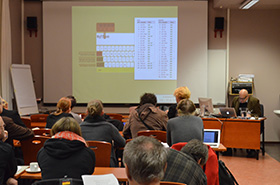 (by ede)
(by ede)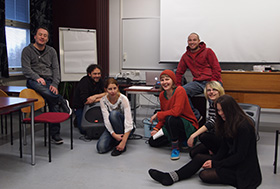 (by sfd)
(by sfd)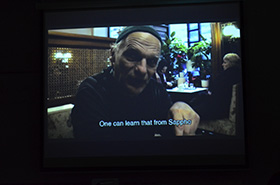 (by ede)
(by ede)